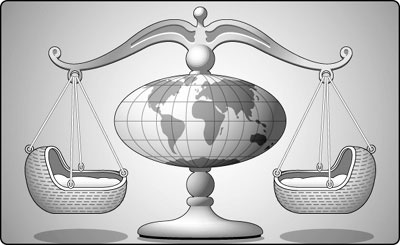Continuing issues and debate concerning transnational commercial surrogacy during the COVID-19 pandemic and beyond
By Yuri Hibino, Sonia Allan, and Damian Adams,
BioNews
| 11. 30. 2020
The regulation of surrogacy varies around the world. Most countries that have laws, prohibit all forms of surrogacy, while several permit altruistic arrangements. A small number permit commercial surrogacy arrangements, and accept commissioning couples, or singles from nations where prohibitions exist. As a result, issues abound. For example, despite growing recognition that children have a right to information about their birth mother, gamete donor(s), and genetic siblings, transnational arrangements may provide little to no opportunity to build relationships when separated by language, culture, and/or location. Issues regarding the sale and commodification of children persist; cases of child abandonment are known. Trafficking of women across borders, bonded labour, health risks associated with surrogacy and egg donation, and ill-treatment of surrogates and intending mothers reported.
In 2020, COVID-19 also saw up to 1000 babies left in hospitals (or orphanages) in Russia, with intending parents unable to travel. In the Ukraine, babies were cared for in hotel rooms by nurses or nannies, or placed into public care (see BioNews 1048). Some surrogates struggled as they bonded with the baby or worried...
Related Articles
By Diaa Hadid and Shweta Desai, NPR | 01.29.2026
MUMBRA, India — The afternoon sun shines on the woman in a commuter-town café, highlighting her almond-shaped eyes and pale skin, a look often sought after by couples who need an egg to have a baby.
"I have good eggs,"...
By George Janes, BioNews | 01.12.2026
A heart attack patient has become the first person to be treated in a clinical trial of an experimental gene therapy, which aims to strengthen blood vessels after coronary bypass surgery.
Coronary artery bypass surgery is performed to treat...
By Staff, ScienceDaily | 01.05.2026
Scientists at UNSW Sydney have developed a new form of CRISPR technology that could make gene therapy safer while also resolving a decades-long debate about how genes are switched off. The research shows that small chemical markers attached to DNA
...
Following a long-standing CGS tradition, we present a selection of our favorite Biopolitical Times posts of the past year.
In 2025, we published up to four posts every month, written by 12 authors (staff, consultants and allies), some in collaboration and one simply credited to CGS.
These titles are presented in chronological order, except for three In Memoriam notices, which follow. Many more posts that are worth your time can be found in the archive. Scroll down and “VIEW...




